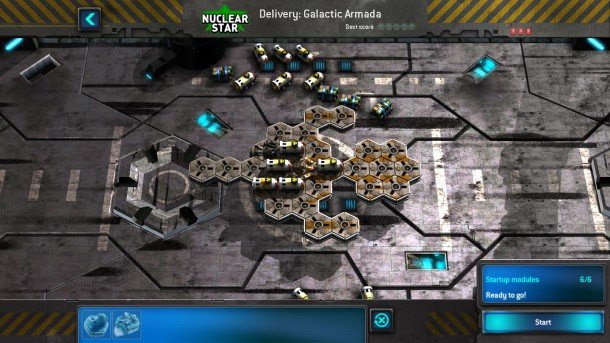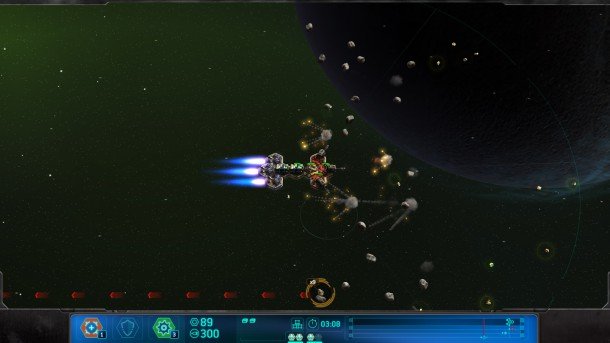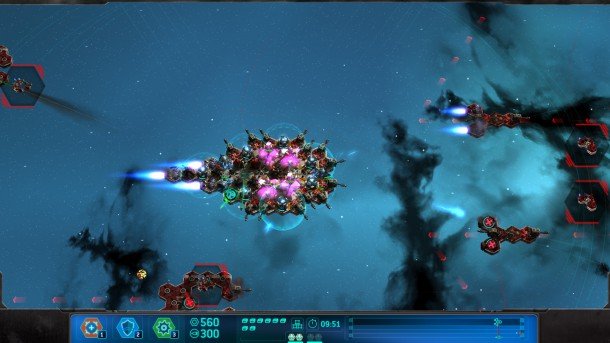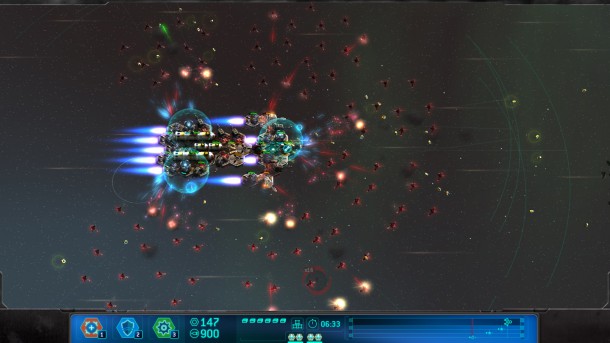Our Verdict
Space Run is a fairly fun twist on tower defense, but it lacks much of the genres interesting experimentation.
PC Gamer's got your back
Tower defense games flip typical game design around: you design the levels, and the computer tries to survive your death maze. Space Run is kind of a tower defense game, but it flips the concept back around again: you design a spaceship and try to survive a cargo run through waves of asteroids and enemy ships. It's fun, but the re-reversal isn't wholly successful, requiring more memorization and micromanagement than clever design and experimentation.
The ships are hexagonal grids which you first outfit with an engine and cargo; you're a space delivery man, and the goal is to reach your destination quickly with all your cargo intact. Once you've designed your starting layout, you blast off in a straight line toward your destination and start building: laser turrets, missile launchers, shields, extra engines, and special modules such as a missile defense system.
The faults in our stars
It doesn't make much sense that you're building your ship in transit, but making sense is overrated. Every mission starts you out with enough cash to plop down a few basic laser turrets to react to the first threat indicators—an asteroid field hurtling toward the port side of the ship, for instance. In standard tower defense fashion, weapons fire automatically, so your decision is about where to place them and how to orient them.
Money to buy new components accrues slowly on its own, but destroyed space antagonists leave behind the bulk of your funds. The first few waves are about blasting as much as you can to earn enough money to take care of later threats. If I make a mistake here and let a juicy cargo ship sail by undestroyed, I restart the mission. Botching this first task only leads to heartache later, and there are no checkpoints, though the missions never take more than 15 minutes. Even if they're brief, it's frustrating that a mistake in the first minute of a mission can doom an entire run, a symptom of having too few solutions. There doesn't seem to be many right ways to play Space Run: watching YouTube videos, I see that other players did almost exactly what I did, with no surprise techniques.

The key is not to try to perfect my ship's layout. Creating a symmetrical, optimized design is something I naturally want to do when I'm given a spaceship to build on, but if Space Run were about elegance it might have included a way to pause and issue commands rather than requiring the speedy use of keyboard shortcuts in real-time. It's much more about quick micromanagement. Aside from building and repairing, each module has unlockable special abilities which require hands-on attention: by the middle of the game, I can reorient turrets, temporarily increase their firepower, temporarily give my missile launchers an increased view angle, recharge shields, repair damaged hex cells, and so on.
By far the most powerful special ability lets you temporarily turn off an engine in exchange for extra money. It's a necessary ability in the fairly difficult later missions, where success requires shrewd resource management and some memorization of the course. Once I know what to expect, I can choreograph my initial actions to maximize cash flow and gain the surplus needed to cover every hex with a missile launcher, turret, engine, or shield. Beating a difficult mission might mean restarting four or five times until I have it down, but it's better than wasting ten minutes coasting toward certain failure.

The Kessel Run
Using foresight and speed to win doesn't stimulate my love of strategy, but Space Run is still fun for that surface-level action gameplay. Moment to moment, I'm experiencing the pressure of reacting to new threats, the satisfaction of watching lasers and missiles do their jobs, and the basic extrinsic pleasure of mousing over floating space money to collect a big payday after blowing up a fleet of pirate drones.
And there are times when Space Run does make me scratch my head. Some missions introduce tricky problems: basic cargo is easy to place, but one employer asks you to transport passenger suites which must be positioned on the outside of the ship and must be powered by power plants. Another loads you down with energy-draining crystals. There's never a clearly optimal solution to cargo placement, which I like, and later missions are plenty difficult on the first few tries.

The best part of Space Run's design is the requirement that missions be completed speedily. If I could just lackadaisically drift through space building armaments, there wouldn't be any room for improvement. To avoid failing and to earn a better Reputation rating (stars which unlock more missions), I have to sacrifice defenses to build more engines, a tricky balancing act that gives me reason to replay missions to perfection.
I like the presentation, too. Aside from a weirdly long initial loading screen, Space Run is technically sound on my older Radeon and consistently attractive, if not ever beautiful or wildly creative. My biggest superficial complaint is that while the voice acting is pretty good, I wanted to strangle my robot companion after the fifth time he said “Can I say, 'ouch?'” The 80's sci-fi inspired protagonist is also a bit of a dully cliché womanizing ass, but his story is easily skipped over.
Space Run's successes are enough to make it fun—a mildly-tactical blend of RTS and action that's neither a great tower defense game nor a great space combat game. It appears deeper than it is, emphasizing the perfection-by-memorization of a platformer over the experimentation of an RTS, but that makes it something I haven't quite experienced before.
Details
- Price: £11 / $15
- Release: Out now
- Publisher: Focus Home Interactive
- Developer: Passtech Games
- Website: http://spacerun-thegame.com/
- Multiplayer: None
Space Run is a fairly fun twist on tower defense, but it lacks much of the genres interesting experimentation.

Tyler grew up in Silicon Valley during the '80s and '90s, playing games like Zork and Arkanoid on early PCs. He was later captivated by Myst, SimCity, Civilization, Command & Conquer, all the shooters they call "boomer shooters" now, and PS1 classic Bushido Blade (that's right: he had Bleem!). Tyler joined PC Gamer in 2011, and today he's focused on the site's news coverage. His hobbies include amateur boxing and adding to his 1,200-plus hours in Rocket League.


